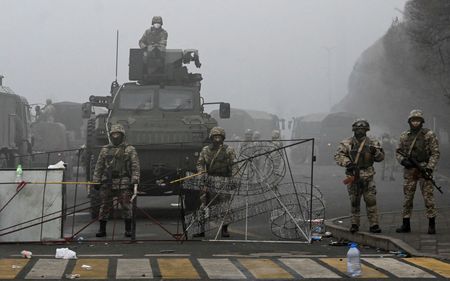
By Mariya Gordeyeva and Olzhas Auyezov
ALMATY (Reuters) – Kazatomprom, the world’s biggest uranium producer, said on Thursday it was operating normally with no impact on output or exports despite unrest in Kazakhstan.
Uranium prices have risen after unrest in Kazakhstan which was spurred initially by protests against fuel price hikes. Spot prices hit $45.50 per pound on Wednesday, the highest since Nov. 30, according to a Platts assessment.
But the central Asian country’s political turmoil does not seem to have so far affected key industries.
“Uranium mining is going according to plan. There have been no stoppages. The company is fulfilling its export contracts,” a Kazatomprom spokesperson said.
Kazatomprom’s attributable production represented approximately 23% of global primary uranium output in 2020, according to the company’s website.
Kazatomprom’s London-listed shares clawed back some losses after the announcement, finishing Thursday down 6.7%. They earlier hit the lowest since the end of September, adding to Wednesday’s 8% drop.
Shares in other uranium producers fell on Thursday after Wednesday gains. Shares in Canada’s Cameco Corp fell 3.7% on Thursday and a uranium exchange traded fund (ETF) from Global X fell 3.6% .
Cameco representatives could not be reached for comment, nor could representatives from Canada-based Uranium One, which is a subsidiary of Russia’s state-owned nuclear corporation Rosatom GK.
United States-based Energy Fuels Inc said it could start producing uranium if the political unrest in Kazakhstan boosted prices for the nuclear fuel.
Earlier, a spokesperson for the Caspian Pipeline Consortium, the group that transports the country’s main crude oil export blend, said it was operating normally. Production at Chevron’s Tengizchevroil venture also has continued.
GRAPHIC – Kazakh turmoil boosting uranium prices
https://graphics.reuters.com/GLOBAL-MARKETS/znvnelkkrpl/chart.png
(Reporting by Mariya Gordeyeva, Olzhas Auyezov; additional reporting by Polina Devitt in Moscow, Anisha Sircar in Bengaluru and Ernest Scheyder in Houston; writing by Sujata Rao; editing by Alexander Smith, Kirsten Donovan and Andrew Heavens)

